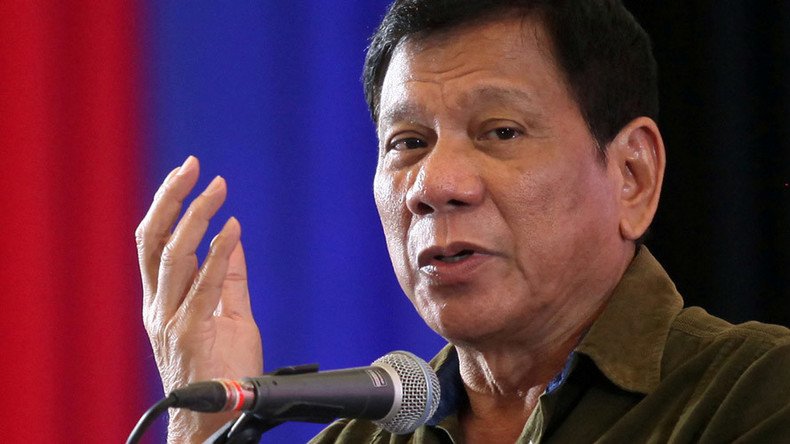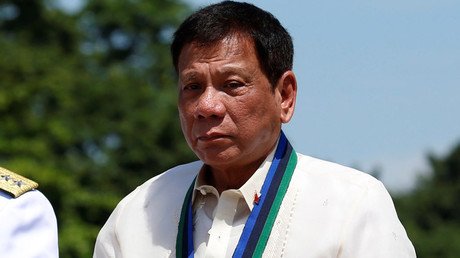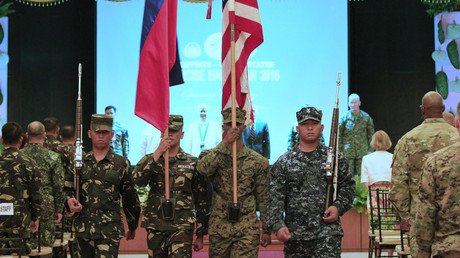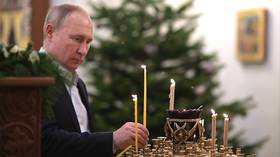US imported terrorism to Middle East, new Philippines president says

Philippine President Rodrigo Duterte has accused the US of importing terror to the Middle East through its interventions, pointing to Iraq, Libya and Syria as examples.
Speaking at an event being held in honor of the holy Islamic day of Eid'l Fit'r in Davao City on Friday, the leader challenged the narrative that the Middle East is the root of terrorism. “It is not that the Middle East is exporting terrorism to America; America imported terrorism (to the Middle East)," he said.
#Blair’s apology ‘not enough, it won’t bring me back my arms, family & country’ – Iraqi war victim https://t.co/6PxLcSBBO0
— RT (@RT_com) July 8, 2016
Duterte slammed the US and UK for presenting Saddam Hussein as a dictator in order to justify the Iraq war of 2003, and for failing to admit their mistakes after the fact. “They forced their way into Iraq,” he told the Muslim crowd.
“After almost 10 years of investigation, it turned out there was no legal basis to declare war against Iraq. You see, it's a useless war," he explained.
“Look at Iraq now. Look what happened to Libya. Look what happened to Syria. Even children are being doused with gasoline. They were pushed to the wall for the failed promises," he added.
The Philippines is not without its own issues of unrest, as groups in the country's minority Muslim regions have been fighting for autonomy in the largely Christian country since the late ‘60s.
Duterte wants to hold peace talks between groups in the region, the Moro National Liberation Front, and its offshoot, the Moro Islamic Liberation Front, in order to work out details of an autonomy agreement reached in 2014. He urged the leaders to focus on peace. “Let us build a nation that will be founded on peace and understanding,” he said.
“It will not come overnight. Certainly, it will not come next year. Probably, it will be something about two to three years from now. But I assure you that something will change before I end my term.”
Duterte also said he would not call the Abu Sayyaf rebel group criminals, as they were “driven to desperation,” thanks to failed promises and a lack of governance. “That’s why they were pushed to the wall,” he said. “They were radicalized.”
The group have been called terrorists and bandits due to their kidnappings and assassinations, and the Philippine government has fought them for years. In April, the group reportedly pledged allegiance to terrorist group Islamic State (IS, formerly ISIS/ISIL).
Duterte, a former Davao City mayor, was elected president in June 2016, after an outspoken campaign promising to crack down on crime. Soon after his term as president started, his military chief said they would engage in a “shock and awe” tactic to tackle the rebel group that has pledged allegiance to IS.
Nine Abu Sayyaf members and a soldier were killed on Thursday in clashes between armed forces and the group in southern Philippines, al Jazeera reports.
Duterte drew comparisons with his own country’s brush with colonialism, pointing to the fact that everyone was “natives of the sultanes” until Spanish colonialism which brought with it Christianity.
“So although religion is a very sensitive issue, let us not really do something that will inflame or agitate trouble about religion. We all believe in the same God.” he added.
The new president has said his foreign policy will not be dependant on the US, with whom the Philippines enjoy a defense partnership, and will “be a line that is not intended to please anybody but the Filipino interest.”
He has spoken about engaging in talks with long-term rival China over the disputed South China Sea, a conflict over which Washington and Beijing have been clashing for years.














